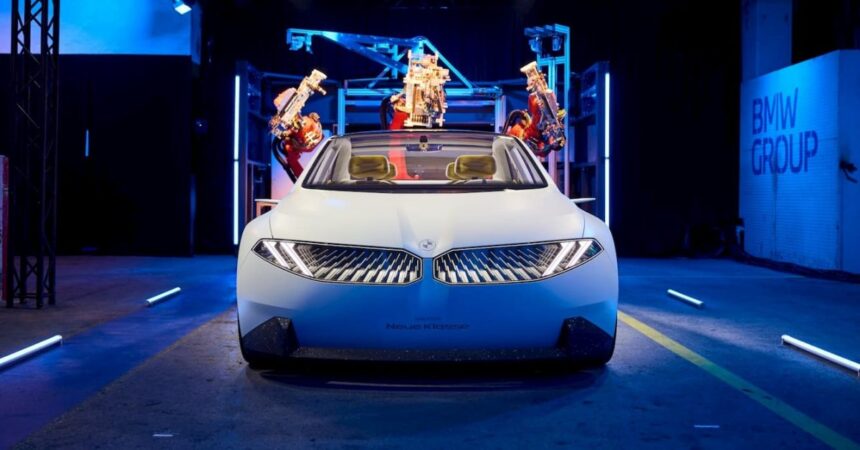As Europe’s largest automobile market, Germany has played a pivotal role in driving the growth of electric vehicles (EVs). However, a forecasted 14% decline in electric vehicle (EV) sales is expected to deviate from the previous trajectory, marking the first such decrease in eight years.
Germany’s Association of the Automotive Industry (VDA) reports that electric vehicles (EVs) in the country may experience a decline from 524,000 units sold last year – the highest number across all European markets – to approximately 451,000 units this year. As Germany pursues its ambitious goal of having 15 million battery-electric vehicles (BEVs) on its roads by 2030, it’s clear that current progress is veering off course.
The sudden decline is largely attributed to Germany’s unexpected discontinuation of its electric vehicle (EV) subsidy programme in December, a full year ahead of schedule. As the industry’s trifecta of concerns – including inflation, skyrocketing automotive costs, and subpar charging infrastructure – converges, it’s a mathematical certainty that overall sales figures will plummet.
As a result, manufacturers are accelerating the release of electric vehicles (EVs), while rental companies are deliberately ordering their fleet models.
Despite the subsidy loss, major automotive players such as Tesla, Volkswagen, Audi, Stellantis, and Mercedes-Benz have stepped up to fill the void temporarily.
Renault on Monday announced a decision to postpone the initial public offering (IPO) for its electric vehicle (EV) subsidiary Ampere, citing sluggish demand and challenging market conditions as the primary reasons. According to Bloomberg, Volkswagen is reportedly following a similar path with its electric vehicle business, as insiders reveal that the German automaker is delaying its initial public offering (IPO) plans for its battery unit.
Despite this, the decline is hardly surprising: Germany’s passenger car market is forecasted to contract by just 1% to approximately 2.82 million units this year, according to VDA estimates. According to industry reports and data from the Vehicle Data Association (VDA), the current decline is part of a downward trend that has been unfolding since the pandemic’s onset.
According to VDA estimates, the global automotive market is forecasted to experience a moderate 2% growth, resulting in approximately 77.4 million vehicle sales, a figure slightly lower than the pre-pandemic total of 78.8 million vehicles. By 2025, the global automotive market is expected to expand by a modest 2%, reaching an estimated total of approximately 77.4 million vehicles.
According to predictions, Germany is poised to produce approximately 1.45 million electric vehicles (EVs) by year’s end; yet, a significant portion of this output is expected to be allocated for export. While China leads as the world’s largest passenger automotive battery-electric vehicle (BEV) producer, with Germany ranking second, a significant gap exists between the two countries: in 2023, China produced 6.6 million BEVs compared to Germany’s 1.2 million.
For comparability, the US produced 1.1 million EVs final 12 months, in accordance with knowledge from VDA and S&P International Mobility.
Electrek’s Take
The underlying concern is that the Vehicle Data Alliance (VDA) serves as a lobby group for Germany’s leading automobile manufacturers – BMW, Volkswagen, and Mercedes-Benz – which are currently facing the challenge of adapting to electric vehicles (EVs) while keeping pace with Chinese companies like BYD and Tesla. Porsche’s Chief Financial Officer, Lutz Meschke, has cast a shadow over the electric vehicle (EV) sector with his warning that Europe might revisit its 2035 deadline for banning internal combustion engine (ICE) cars due to slowing EV demand. This news is hardly reassuring and hints at potential turbulence ahead.
Jobs – particularly those offering good pay, benefits, and protections – are also feeling the pinch: Volkswagen has hinted at reducing hundreds of positions in Germany to offset an $11 billion price cut, while German EV suppliers are cutting jobs as well, with one major supplier announcing a 20% workforce reduction due to sluggish demand.
However, in the dynamic auto industry, fluctuations in demand are a norm, with electric vehicles (EVs) no exception to this rule of supply and demand. Despite this trend, European automakers are crafting innovative designs to stay ahead of the game. BMW is committing $711 million (€650 million) to revamp its core production facility in Munich, with the goal of exclusively manufacturing electric vehicles by the end of 2027, as it accelerates production of its cutting-edge Neue Klasse EVs. The automaker has successfully achieved a 15% market share for battery-electric vehicles, with plans to further accelerate the trend by promoting over half a million BEVs on the roads in 2024 alone?











